PFAS, per- & polyfluoroalkyl substances
Certified reference standards prepared by Wellington LaboratoriesOur reagents enable PFAS substances to be analysed accurately, reliably and in compliance with international standards.
Our reagents for your PFAS analyses
The reference standards developed by Wellington Laboratories are intended for public and private laboratories, organisations and professionals who need to identify PFAS present in various media (water, air, soil, sediment, biota, etc.). PFAS are persistent organic pollutants (POPs) that are potentially dangerous to health and the environment, and are subject to increased regulation and monitoring. Wellington Laboratories’ reagents enable these analyses to be carried out accurately, reliably and in compliance with international standards.
BCP Instruments is the exclusive distributor of the entire range for France and Belgium.
To help you carry out your PFAS analyses, we offer you all the references in the Wellington catalogue, which you can consult online or download in PDF format. Contact us using the form below to obtain a quote.
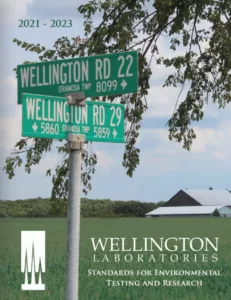
The expertise of Wellington Laboratories
PFAS analysis: the importance of analytical standards for reliable assessment.
The analysis of PFAS in various media (water, air, soils, sediment, biota, etc.) is therefore essential to assess their presence, origin, fate and impact. To carry out this analysis, it is necessary to have analytical standards, i.e. reference substances that can be used to calibrate the measuring instruments and check the quality of the results. Analytical standards can be native, i.e. identical to PFAS present in the environment, or labelled with carbon 13 (13C), i.e. enriched with this stable carbon isotope, which makes it possible to distinguish them from natural PFAS and avoid interference.
Wellington Laboratories: blends of analytical standards for PFAS in accordance with recognised protocols.
Since 2004, Wellington Laboratories has been taking an interest in these substances, expanding its range of analytical standards for PFAS, both native and carbon-13 labelled. They prepared standard mixtures in accordance with EPA methods 533, 537, 1633, EU 5813 and ISO 21675, which are recognised protocols for the analysis of PFAS.
These blends contain the main PFASs targeted by the regulations, such as PFOA (perfluorooctanoic acid) and PFOS (perfluorooctane sulphonate), as well as other emerging PFASs, such as GenX (perfluoro-2-propoxypropanoic acid) and ADONA (perfluoro-3,6-dioxaheptanoic acid).
Wellington Laboratories: high-quality reagents for reliable, accurate and safe analysis.
Laboratoires Wellington’s reagents are of the highest quality (purity> 98%) and comply with current standards. All CRMs are ISO 9001, ISO/IEC 17025 and ISO 17034 certified.
What’s more, each ampoule delivered is accompanied by a certificate of analysis which indicates the purity, concentration, stability and traceability of the standard. These reagents are approved by numerous laboratories and official bodies, demonstrating their satisfaction and confidence. That’s why, by choosing Wellington Laboratories’ analytical standards, you benefit from recognised expertise and a personalised service.
To help you carry out your PFAS analyses, BCP Instruments offers you all the references in the Wellington catalogue, which you can consult online or download in PDF format.
You can also visit our page dedicated to Wellington Laboratories.
Our range of native and mass-labelled PFAS standards:
PFC-CVS-C
Fluorotelomer acids and sulfonates
Sulfonamides and sulfonates
Carboxylic and phosphonic acids
Cationic and zwitterionic compounds
Perfluorinated sulfonylimides
Polyfluoroalkyl phosphate esters
Analytical methods
PFOS, PFOA et dérivés
PFAS mixtures
Do you have a question? Contact us using the contact form. We will be delighted to advise you.
Documentation




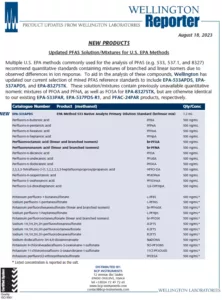
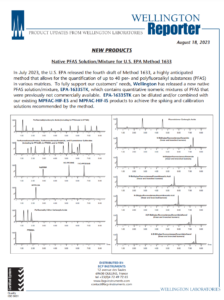
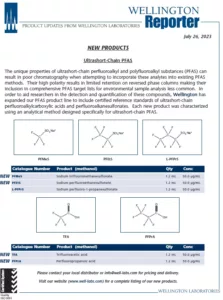
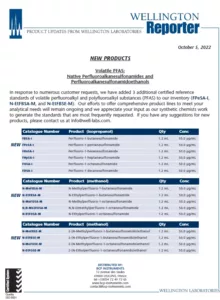
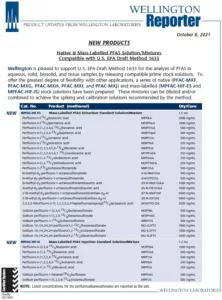
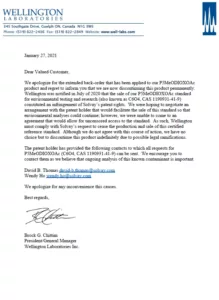
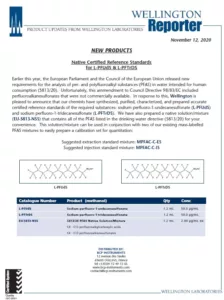
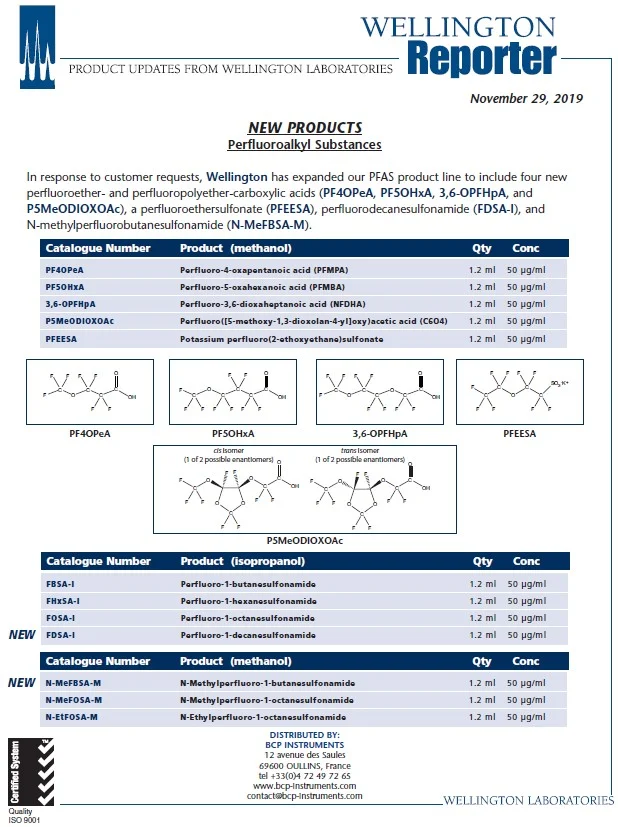
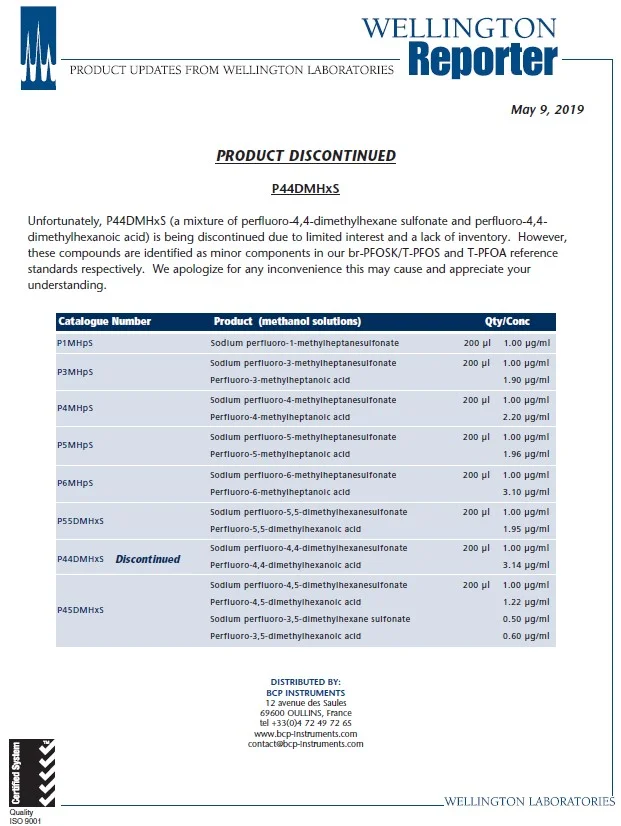
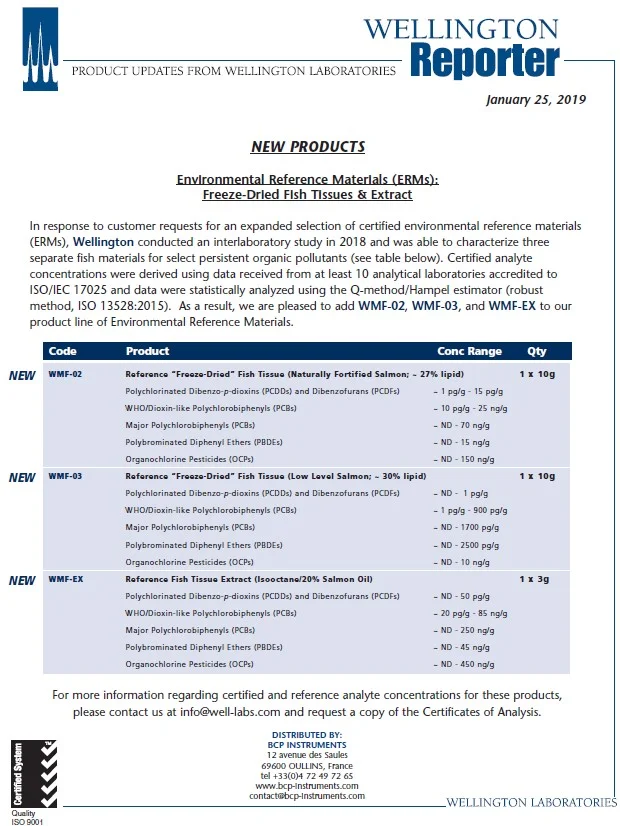
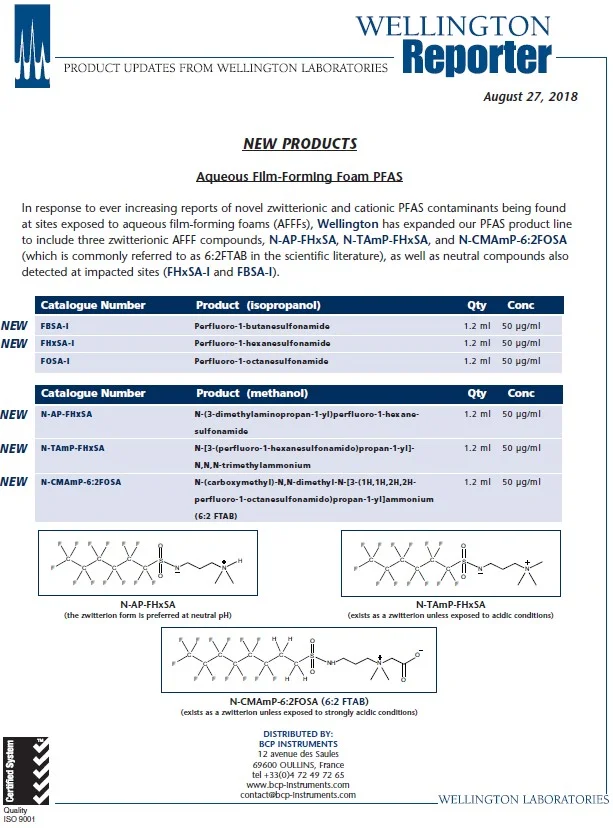
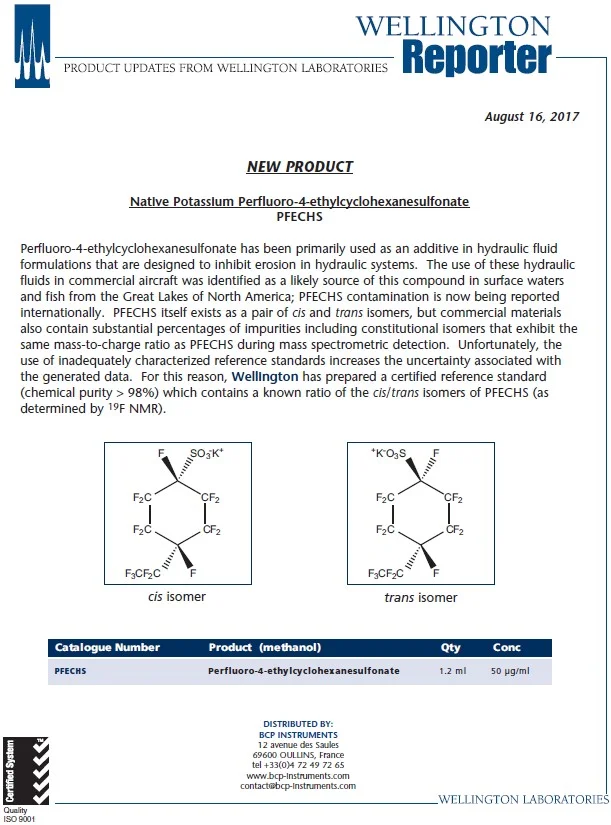
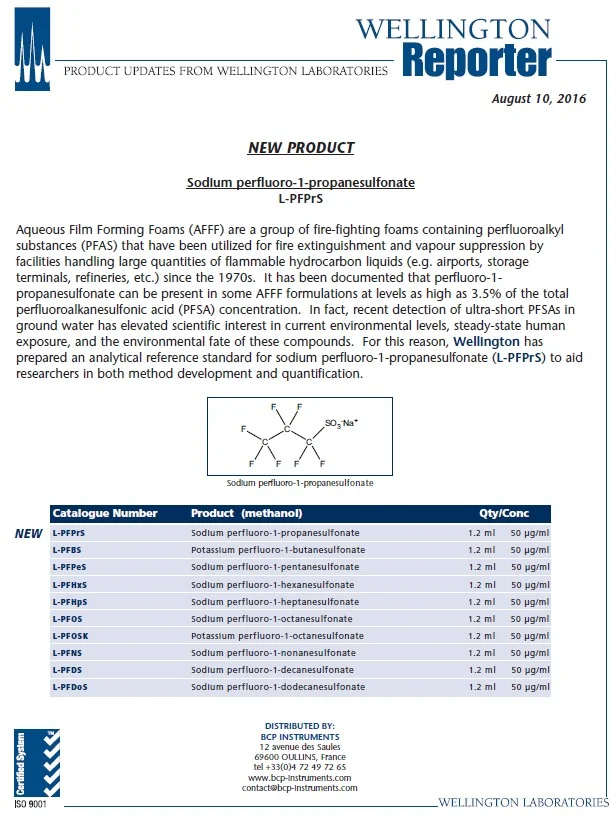

PFAS, per- polyfluoroalkyl Substances

Halogenated flame retardants, HFRs and other compounds
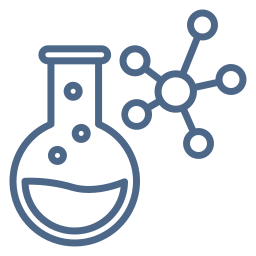
Polychlorinated biphenyls, PCBs
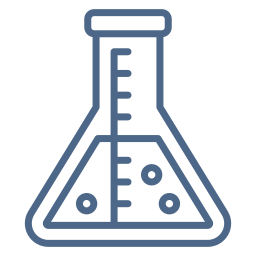
Polybrominated diphenyl ethers, PBDEs Polybrominated biphenyls, PBBs

Dioxins, Furans, PCDDs, PCDFs

Organochlorine Pesticides, OCP

Certified reference materials

Other reagents
Find out more about PFAS
PFAS (per- and polyfluoroalkylated substances) pose numerous challenges for the protection of health and the environment. Their analysis requires specialised techniques because of their chemical stability and low concentration in environmental samples.
This is why we offer high-quality solutions and standards for your PFAS analyses, facilitating the detection and quantification of these compounds in a variety of samples.
What are per- & polyfluoroalkylated substances (PFAS)?
PFASs are synthetic chemicals that all have very stable carbon-fluorine bonds. They form a large family of over 4,000 chemical compounds, also known as persistent pollutants (POPs).
Why this name? Because these substances are extremely persistent and accumulate everywhere: in soils, water, animals and humans. In fact, they are so resistant that they can remain in the environment for thousands of years, without degrading or dissipating.
PFAS, persistent organic pollutants (POPs)
These substances have a wide range of uses: protective coatings for clothing, furnishings, food packaging, non-stick pans, waterproofing sprays, fire-fighting foams, etc. In addition, because they are highly volatile, they easily contaminate foodstuffs, surface water and groundwater, and are found a long way from where they are produced.
For example, traces of PFAS have been detected in the drinking water of over 200 million people in the United States, in the breast milk of women in Kenya and in the blood of seals and polar bears in the Arctic. This is why they are described as eternal pollutants and are also categorised as persistent organic pollutants (POPs).
Regulation of PFAS in France
PFASs are considered to be endocrine disruptors, i.e. substances that interfere with the hormonal system and can cause adverse health effects such as cancer, immune, metabolic or reproductive disorders. It is therefore necessary to strengthen the regulation, monitoring and management of these compounds, and to develop safer and more environmentally-friendly alternatives. Following on from the Stockholm Convention, ratified by France in 2004, and the REACH Regulation in Europe, changes to the regulatory framework are planned between now and 2026 to reduce PFAS emissions and ban non-essential uses.
Do you need laboratory equipment and/or consumables?
Feel free to contact us at any time.
